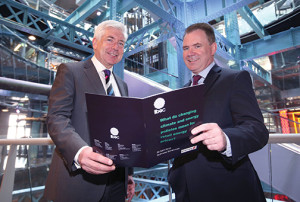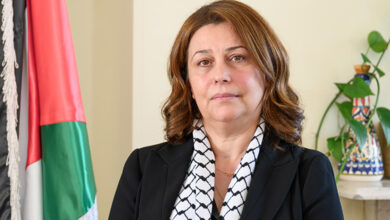Industrial energy users conference
Energy remains a key priority for Irish businesses and a recent Ibec conference briefed customers on the main trends affecting prices and supply.
Nearly one hundred industrial companies recently met at the Guinness Storehouse to hear about impending changes in the EU and national policy framework for energy and climate. This event was part of Ibec’s ‘An Ireland that works’ campaign. The conference chairman, Frank Gleeson (Aramark’s Managing Director of Food Services), welcomed the delegates, remarking that the high turnout reflected the importance of secure, affordable energy for Irish businesses.
The keynote speaker, Minister Alex White, thanked Ibec’s members for their engagement on the Department of Communications, Energy and Natural Resources’ (DCENR) recent green paper consultation. He indicated that headline points from the white paper will be published in early June. Minister White also stated that the international fight against climate change will have implications, not only for capital investment in Ireland but also for job creation, and welcomed EirGrid’s fresh approach to planning the transmission network. In closing, he urged industry to play an active role in the reform of the all-island electricity market, and expressed the hope that it will deliver affordable and secure energy through enhanced supply competition.
The first conference session, moderated by John MacNamara of Bord na Móna, focused on international market trends. Martin Howley, manager of the Sustainable Energy Authority of Ireland’s (SEAI) statistical support unit, confirmed that electricity and gas prices for most categories of business user are now near to the EU average. However, European prices generally remain well above those in the USA. John Heffernan, Power Trading Manager for Bord Gáis Energy, provided insights into the impact on wholesale electricity prices of factors such as gas costs, renewables and interconnector flows. Chris Webb (representing the International Federation of Industrial Energy Consumers) voiced serious concern about the apparent lack of a coherent EU-wide strategy for security of fuel supply.
The second session, facilitated by Ibec’s Head of Infrastructure Neil Walker, encouraged the delegates to engage with an expert panel. John FitzGerald, adjunct professor at Trinity College Dublin, suggested that the re-design of the Single Electricity Market (SEM) would lead to an unhelpful loss of transparency. He also criticised the European policy framework on greenhouse gas reduction, arguing that a system of carbon taxation would provide more certainty.
However, Chris Scott-Wilson, representing the European Chemical Industry Council, argued that such an approach – if undertaken unilaterally – would be damaging to Europe’s industrial competitiveness. He suggested that Ireland’s policy-makers might wish to consider emulating Germany’s approach to industrial policy, whereby large energy users remain exempt from the most costly public service obligations. Peter O’Shea, ESB’s Head of Regulatory Affairs and Corporate Strategy, noted that to date the EU emissions trading system and the SEM have both delivered what they promised, but much greater challenges lie ahead, particularly for market reforms.
The final session, overseen by Tadg Farrell of Boliden Tara Mines, featured a progress update from Commission for Energy Regulation Director Laura Brien on the I-SEM project followed by an overview from Majella Kelleher of SEAI on the opportunities for business energy cost savings. The final wrap-up by the department’s special advisor, Fergal McNamara, was followed by a networking lunch. Copies of all the slides, along with Ibec’s recently published policy briefing note on the electricity market reform project, are available at www.ibec.ie/energy






